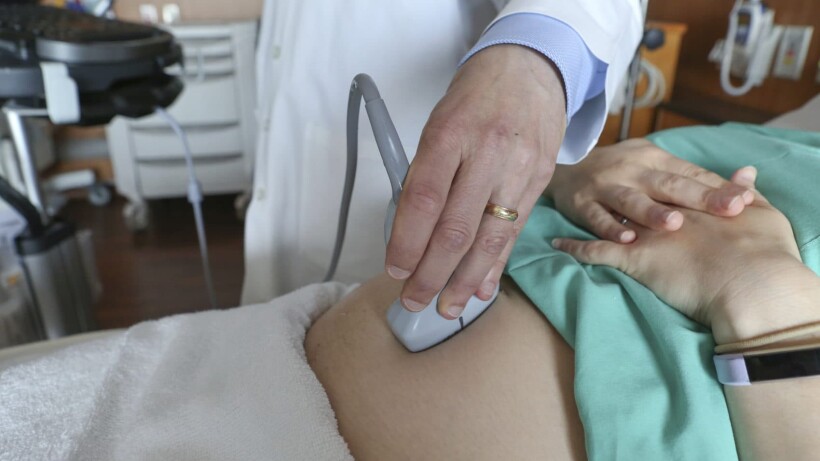Northwestern Medicine Prentice Women’s Hospital, where doctors and midwives deliver the most babies in the entire state, is so busy the medical center near downtown Chicago is cutting back on letting patients schedule when to be induced for labor, WBEZ has learned.
That’s even though Northwestern led a national study that found inducing low-risk women at 39 weeks instead of letting labor happen naturally reduces the rate of Cesarean sections and decreases complications for mothers and babies. C-sections can be life-saving, but also are major surgeries with potential consequences that disproportionately affect Black women, research shows, such as infections and hysterectomies.
Yet while Prentice is bustling with deliveries, Northwestern executives have reduced the number of postpartum rooms where patients move to after delivering, and antepartum rooms where pregnant patients who have complications need to be monitored overnight in the hospital, such as those who have dangerously high blood pressure.
“It backs up the number of women who can labor if the patients who have given birth don’t have a room to be transferred to after giving birth,” said Dr. Melissa Simon, who is vice chair for research in the OB-GYN department at Northwestern.
Instead, the health system has converted obstetrics beds into those for general medical care and surgery, according to Illinois health care regulators.
Providers delivered nearly 12,000 babies in 2022 at Prentice, according to the most recent state public health data. That’s almost three times more than the next busiest hospital for deliveries, Advocate Christ Medical Center in south suburban Oak Lawn, according to a WBEZ analysis of state public health data.
Prentice is one of the biggest labor and delivery hospitals in the country, according to the American Hospital Association.
Simon said the hospital is brimming with patients for a variety of reasons. For one, many hospitals have closed labor and delivery units, funneling high-risk patients to specialists at academic medical centers including Northwestern.
“We must prioritize people who are pregnant who are really sick and need to be cared for, and people who are pregnant with babies who need to be taken care of as soon as they’re born,” Simon said.
Since the U.S. Supreme Court overturned Roe v Wade about two years ago, Illinois has become surrounded by states that have further restricted or banned abortion. That’s led patients to Northwestern, where they might be seeking an abortion or a second opinion about a complicated pregnancy.
Then there’s the space crunch, Simon said. Effective March 31, for example, Northwestern added 20 beds for those needing medical and surgical care, for a total of 575 of these beds, and decreased obstetrics beds by 18, for a total of 116 of these beds, according to the state.
Simon said hospital leaders could rethink how to make beds more flexible.
“They could be postpartum or med-surg rooms depending on the ebb and flow of the volume and the need,” she said.
In a statement, Northwestern spokesman Chris King said Prentice is one of many hospitals across the country treating more patients.
“We are working closely with medical leadership as we navigate the needs of our patients in all clinical settings as the health and safety of our patients remains our highest priority,” King said.
While Prentice has temporarily decreased the number of slots for elective inductions per day, Simon said providers still stand behind the Northwestern study touting the benefits of scheduling an induction.
Still, some patients are nervous about the changes. A mother who is due next month with her third child told WBEZ she is worried about not getting induced as originally planned with her doctor. She said her previous two deliveries were relatively quick and she hemorrhaged both times. She lives about an hour from Prentice.
“I worry a lot about going into labor in the car and bleeding out in the car,” said the woman, who does not want to be named for fear of retaliation. “I’ve been really relying on the induction.”
During a recent appointment, she said her providers made it clear an induction could be off the table.
Anisha Kshetrapal is 39 weeks pregnant with her first baby and set to give birth at Prentice. She learned firsthand just how busy the hospital is when she was waitlisted for her procedure, which she needs because her baby is breech. She said she was second or third in line for multiple dates. Her midwives and doula told her the hospital was full partly because there just aren’t enough rooms for patients, and that some patients were waiting 10 to 12 hours after delivering their babies to move to a room to recover.
“The closer we’ve gotten — we’ve already gone past one of the dates on our list — and there being no movement on the list was what was concerning to me,” Kshetrapal said. “There’s just no way to get off a list if every (operating room) is taken and everyone’s busy with other patients.”
Kshetrapal, an emergency medicine physician at Lurie Children’s Hospital next door to Prentice, was finally able to get her delivery scheduled.
Kristen Schorsch covers public health and Cook County government for WBEZ.





